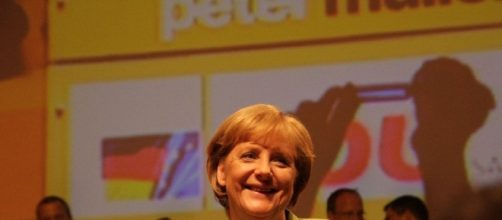German Chancellor Angela Merkel has been criticised for appointing a foreign policy adviser who designed her open border policy.
Jan Hecker designed the controversial policy in October 2015 when Ms Merkel announced one million migrants would be entering Germany. The former federal judge has been brought onto the Chancellor's team for tough coalition talks this week and next, with immigration being a substantial issue.
Ms Merkel has failed the German people
Mr. Hecker's involvement is likely to be questioned by many of the Chancellor's opponents. Despite reversing her open border policy, her opposition will accuse her of failing to learn from the past after retaining the designer of the damaging measure.
Ms Merkel's Christian Democratic Union of Germany (CDU) party has made strident efforts to avoid being associated with the far-right Alternative for Germany (AfD) party to avert an electoral meltdown. The latter benefitted from an overwhelming rejection of the Chancellor's refugee policy in the September election. The CDU achieved its worst result since 1949.
The CDU's Bavarian sister party, the CSU, forced the Chancellor into compromising on her open border policy in a bid to strike a coalition deal. CSU leader Horst Seehofer and Ms Merkel agreed to an upper immigration limit of 200,000 new arrivals per year. Strict new criteria would also make it increasingly difficult to settle in Germany.
Many in the German press are sceptical of the proposed coalition.
One journalist suggested that the Chancellor had failed the German people by ignoring the problem of immigration before the AfD had been elected to parliament.
During a joint press conference held by the Chancellor and Mr. Seehofer, where they announced the new immigration policy, Ms Merkel was embarrassed by a reporter, who said her party had suffered massive damages during the election. He then asked her why she did not reverse this policy before.
The CDU leader responded by saying it was reasonable to ask questions as to why a change of direction was not considered sooner. She said a lot of work has been carried out since October 2015 and it is only possible now to place all the pieces together.
She concluded that there is a time to sort out everything.
Mr. Seehofer said a lot has changed since September 2015. He quoted Ms Merkel by saying the refugee policy was the missing piece. He added that the agreement with Turkey, the closing of the Balkan route, the many asylum laws and other factors also contributed towards this policy transformation.
Such a policy agreement should not be reached
Following the agreement between the CSU and the CDU, the latter are set to commence coalition talks with the FDP and the Green Party. The CSU and CDU's previous coalition partners, the Socialist Party, refused to participate in discussions after suffering election losses worse than Ms Merkel's party.
The Greens have expressed their opposition to the new immigration policy. Green co-leader Cem Ozdemir said such a policy agreement should not be reached, though she said it would not be a barrier to further talks. Instead, she is pushing for quick and fair integration measures and an immigration law with clear rules and criteria.
Bavaria has bore the brunt of the Chancellor's refugee policy, with 890,000 migrants entering Germany via Bavaria in 2015 and 280,000 in 2016. The issue is set to spark arguments between the Greens and the CSU.
We would have liked more wind behind us
Lower Saxony, in north-west Germany, was viewed as a possible gain for the CDU during Sunday's local elections. The centre-right candidate, Bernd Althusmann, was likely to replace the Socialist regional president Stephen Weil.
It appears that the governing party's popularity is in decline. According to German newspaper Der Spiegel, Mr. Althusmann is defending the Government's record.
The CDU candidate said his party would have liked more wind behind them. He admitted the refugee policy was ill-judged and that his values must reflect those of the rest of the population's.

